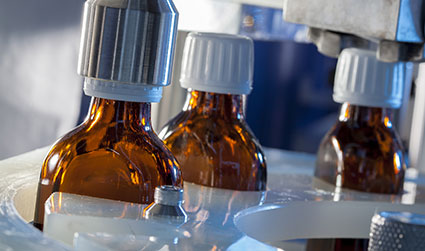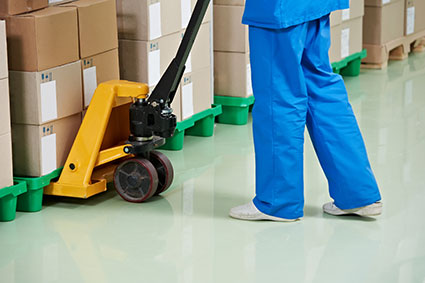Use Plastic Pallets When Safety and Hygiene is Key
Best Practice Pallets for the Pharmaceutical Industry
 There are few industries where the importance of hygiene is more important than in the healthcare and pharmaceutical sector.
There are few industries where the importance of hygiene is more important than in the healthcare and pharmaceutical sector.
When it comes to pharmaceutical products, all aspects of the supply chain—from manufacturing to distribution—need to adhere to a strict policy of quality control and clinical standards. The risks of breaching these standards is not just making consumers and patients sick, but also the potential litigation costs, product recall costs and brand damage for suppliers and distributors.
In the past, pharmaceutical manufacturers have not include pallets as part of quality control programs. As a result of poor quality pallets, pharmaceutical manufacturers such as Johnson & Johnson and Pfizer have issued product recalls due to product contamination from wooden pallets.
Plastic pallets are a safe alternative to wooden pallets in the pharmaceutical and medical industry. For more information about medical-grade pallets, speak to our expert team on 03 9545 7344 today.
Wooden pallets have a higher risk of harbouring bacteria, pests or fungi, while splinters or protruding nails have the potential to break tamper-evident packaging.
The safety and product risks of wooden pallets
The key criteria for pallets in the pharmaceutical industry are clinical hygiene standards. Although wooden pallets are low cost, disposable and easy to repair, they are not the ideal option for this meeting this criteria.
Wooden pallets have a higher risk of harbouring bacteria, pests or fungi, while splinters or protruding nails have the potential to break tamper-evident packaging. Chemicals have also been applied to the surface of wooden pallets as a way to destroy pests or preserve the wood. This potential contamination from bacteria, pests and chemicals pose as a health risk to the consumer and a liability risk to the supplier.

In 2008, pharmaceutical manufacturer Johnson & Johnson drew fire from the public and the US FDA after customer complaints of a moldy and musty smell from arthritis medication, Tylenol. It was believed that the contamination was due to a chemical called 2, 4,-tribromoanisole (TBA), a by-product of another chemical which is used to preserve wooden material. The source of the TBA was traced to the wooden pallets used to transport the drug. The contamination resulted in a wide-spread recall of Tylenol from pharmacy shelves.
A similar incident embroiled Pfizer in 2010, after reports of a similar odor on cholesterol medication Lipitor. It was discovered that the Lipitor odor was also due to TBA contamination from wood pallets, and Pfizer was forced to recalled almost 40,000 bottles of Lipitor as a result. Since then, Pfizer decided to switch from wooden to plastic pallets to eliminate the future risk of contamination from wooden pallets.
The benefits of plastic pallets in the pharmaceutical industry
 The use of plastic as a material for pallets in the pharmaceutical industry eliminates pallet contamination risk during the transport and distribution of medical goods. Here's how:
The use of plastic as a material for pallets in the pharmaceutical industry eliminates pallet contamination risk during the transport and distribution of medical goods. Here's how:
- Plastic pallets are easier to clean and sanitise than wood pallets. The plastic material does not absorb water, so any surface contamination is readily destroyed during the sanitisation process.
- Plastic is an inert material, making it safe to use in highly-sensitive clean rooms and manufacturing facilities.
- Insects and pests cannot live inside the wooden material, and no pesticides are needed for the treatment against these pests.
- No use of chemicals, such as TBA, are needed to treat and preserve pallet material.
- Plastic pallets have no risk of damaging packaging due to protruding nails or splinters.
Without the risk of contamination, the use of plastic pallets will reduce the overall risk to product recall and general liability from contamination.

What to look for in pharmacy grade plastic pallets
Plain Pallets supply high quality, pharmaceutical ready pallets which meet all the necessary criteria:
- Easy to clean and sanitise
- Low contamination risk
- Export quality
- Quality construction; no nails or splinters
- Chemical-free
These properties make the transportation of pharmaceutical products safe and reduce the risk of resulting fines, recalls and general liability for the supplier or distributor.
At Plain Pallets, we have over 40 years’ of experience in supplying safe pallets used in a variety of sensitive industries, including food and beverage and pharmaceuticals. We are fully-insured, so that if you do experience any problems with our pallets, you won’t have to fork out for it yourself; our pallets are a risk-free investment for your business.
Call our friendly team on 03 9999 5755 to find out more about plastic pallets.
Must Read
Plain Pallets on 29 April 2014
How to Get Greater Mileage out of Your Pallets
Do your pallets go the distance? If not, you may be losing money through replacement costs and damaged goods. Get the most out of your pallets ...
Read morePlain Pallets on 11 March 2014
Plain Pallets Display the Future of Sustainability
Pallets are always useful. See the many ways old pallets can be reused. Who knows, maybe your next house or business will have some great pallet furniture! ...
Read more